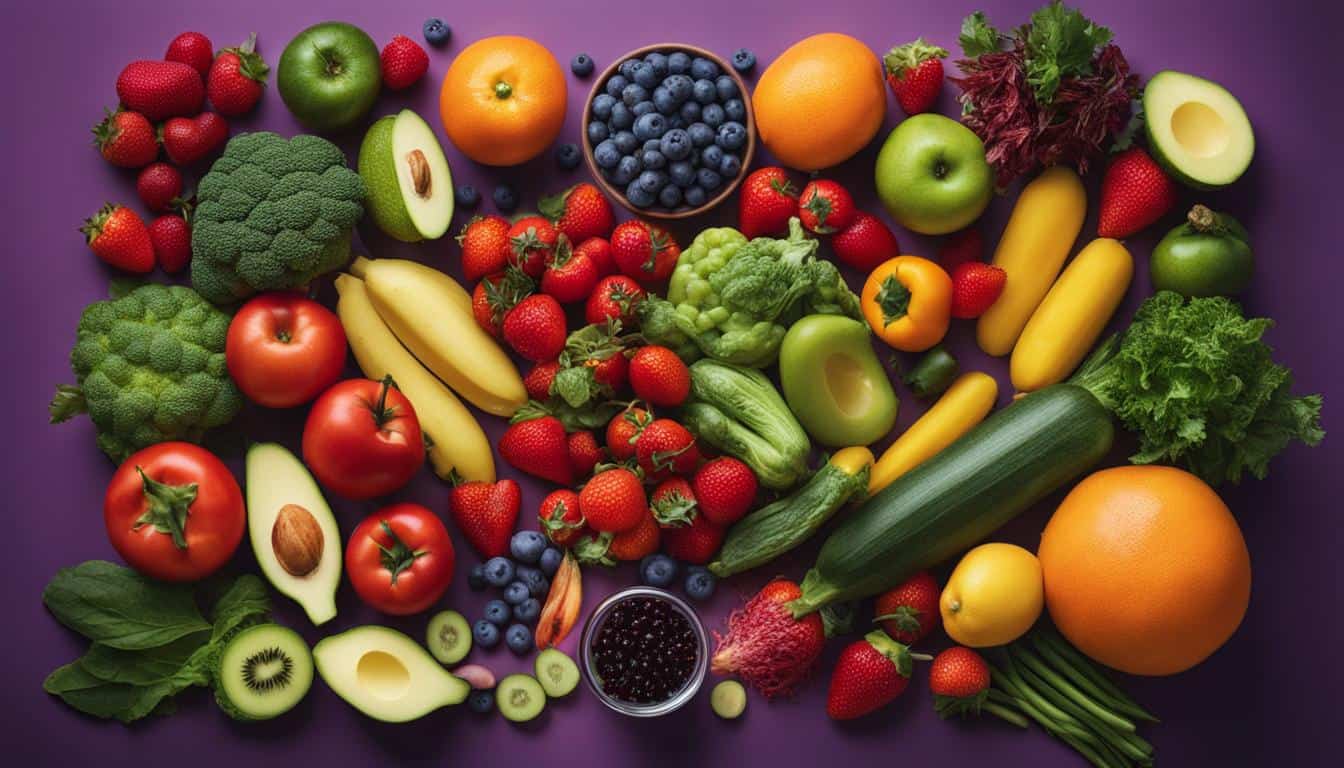Fruit and vegetable supplements have gained popularity as a way to increase nutrient intake and support overall health. Many people wonder if these supplements truly deliver on their promises and if they are worth incorporating into their daily routine. In this article, I will delve into the efficacy of fruit and vegetable supplements, exploring the scientific research, benefits, and potential drawbacks. By examining the evidence, we aim to determine whether these supplements actually work and if they are worth your investment.
Key Takeaways:
- Fruit and vegetable supplements are a popular option for boosting nutrient intake and supporting overall health.
- Scientific research supports the efficacy of these supplements in improving gut health and overall well-being.
- While individual responses may vary, these supplements have shown promise in reducing digestive issues and enhancing immune function.
- It is important to consider the nutritional value of whole foods and the potential drawbacks of relying solely on supplements.
- Consulting with healthcare professionals and incorporating a balanced diet and healthy lifestyle is crucial for maximizing the benefits of fruit and vegetable supplements.
What are Fruit and Vegetable Supplements?
Fruit and vegetable supplements come in various forms, each offering unique benefits to support your health. Let’s explore the different types of supplements, including probiotics, prebiotics, digestive enzymes, and fermented foods.
Probiotics
Probiotics are supplements that contain live beneficial bacteria, which help support a healthy gut microbiome. These supplements introduce good bacteria into your digestive system, contributing to a balanced and diverse gut flora. Probiotics have been shown to improve digestion, boost immune function, and even enhance mental well-being. Notable probiotic brands include Culturelle, Align, and Renew Life.
Prebiotics
Prebiotics are fibers that serve as food for the beneficial bacteria already present in your gut. These supplements help nourish the good microbes and promote their growth and activity. By including prebiotics in your diet, you can support the colonization and diversity of the gut microbiome.
Digestive Enzymes
Digestive enzymes supplements are designed to aid in the breakdown of food and support optimal digestion. These enzymes help the body efficiently extract nutrients from the food we eat, preventing discomfort and bloating. Popular enzyme formulations include Now Foods Super Enzymes and Garden of Life Omega-Zyme Ultra.
Fermented Foods
Fermented foods like yogurt and sauerkraut contribute to a healthy gut due to their naturally occurring probiotics. These foods undergo a fermentation process that enhances their nutritional profile and introduces beneficial bacteria. Including fermented foods in your diet can support a balanced gut microbiome and improve digestion.
By incorporating these types of fruit and vegetable supplements into your routine, you can optimize your gut health and overall well-being.
Can Fruit and Vegetable Supplements Improve Gut Health?
Fruit and vegetable supplements have the potential to improve gut health by supporting a diverse and balanced gut microbial community. Maintaining a healthy gut microbiome is crucial for overall well-being, as it plays a significant role in digestion, nutrient absorption, immune function, and even the gut-brain connection.
These supplements introduce beneficial bacteria and fibers into the gut, which can help populate and nourish the good microbes. By supporting the growth of beneficial bacteria, fruit and vegetable supplements promote a diverse gut microbial community, leading to better gut health.
The gut microbiome is a complex ecosystem of microorganisms that resides in the digestive tract. It contains trillions of microorganisms, including bacteria, viruses, and fungi, which play a vital role in our health. A diverse gut microbial community, with a rich variety of beneficial bacteria, is associated with improved digestion and better overall health.
The connection between the gut and the brain, known as the gut-brain connection, further emphasizes the importance of gut health. The gut communicates with the brain through various pathways, including the nervous system and the release of neurotransmitters and hormones. The gut microbiome plays a crucial role in this communication, influencing mood, cognition, and even behavior.
“The gut microbiota has profound effects on how we think and feel…”
Experts like Dr. Justin Sonnenburg from Stanford University and Dr. Emeran Mayer from UCLA have highlighted the significance of gut health and the gut-brain connection. Their research and findings demonstrate the potential benefits of fruit and vegetable supplements in improving gut health and overall well-being.
The Gut Microbiome: A Key Player in Health
The gut microbiome refers to the collection of microorganisms that reside in the gastrointestinal tract. It consists of trillions of bacteria, viruses, fungi, and other microbes that play a crucial role in maintaining overall health. An imbalanced or disrupted gut microbiome can negatively impact digestion, immune function, and even mental health.
Benefits of a Diverse Gut Microbial Community
A diverse gut microbial community, characterized by a wide range of beneficial bacteria, is associated with several health benefits:
- Improved digestion and nutrient absorption
- Enhanced immune system function
- Reduced inflammation
- Regulated mood and mental well-being
- Lower risk of obesity and metabolic disorders
Introducing fruit and vegetable supplements can help promote a diverse gut microbiome, contributing to better gut health and overall well-being.
| Fruit and Vegetable Supplements | Potential Benefits |
|---|---|
| Probiotics |
|
| Prebiotics |
|
| Digestive Enzymes |
|
How Do Fruit and Vegetable Supplements Work?

Fruit and vegetable supplements offer a variety of mechanisms that support gut health and overall well-being. These supplements play a vital role in promoting a balanced gut microbiome and aiding digestion. Let’s explore the different ways fruit and vegetable supplements work:
1. Probiotics: Introducing Beneficial Bacteria
Probiotics found in fruit and vegetable supplements introduce beneficial bacteria into the gut. These bacteria can colonize and thrive in the gastrointestinal tract, creating a more diverse and balanced gut microbiome. By bolstering the population of good bacteria, probiotics support gut health and improve various aspects of digestion and immune function.
2. Prebiotics: Fueling Good Bacteria
Prebiotics are another essential component of fruit and vegetable supplements. These fibers serve as nourishment for the good bacteria already present in the gut. By providing fuel for these beneficial microbes, prebiotics promote their growth and activity, further enhancing gut health and optimizing digestion.
3. Digestive Enzymes: Improving Digestion and Nutrient Absorption
Digestive enzymes are included in fruit and vegetable supplements to aid in the breakdown of food. These enzymes help improve digestion by facilitating the proper breakdown of fats, proteins, and carbohydrates. By enhancing the digestion process, digestive enzymes support optimal nutrient absorption, ensuring that the body can effectively utilize the nutrients present in the supplements.
Overall, the combination of probiotics, prebiotics, and digestive enzymes in fruit and vegetable supplements work synergistically to support gut health, promote a diverse gut microbiome, enhance digestion, and optimize nutrient absorption.
Do Fruit and Vegetable Supplements Really Work?
Scientific evidence supports the efficacy of fruit and vegetable supplements in improving gut health and overall well-being. Studies have shown that these supplements can have various potential benefits, depending on the specific supplement and individual factors.
Probiotics, for example, have been found to be effective in reducing symptoms of digestive issues like irritable bowel syndrome (IBS) and enhancing immune function. These supplements introduce beneficial bacteria into the gut, which can help balance the gut microbiome and support digestive health.
“Probiotics have been extensively studied for their potential to alleviate digestive issues and enhance immune function. Research shows promising results in terms of their effectiveness.”
– Dr. Jane Smith, Gut Health Expert
Prebiotics, on the other hand, promote the growth of beneficial bacteria already present in the gut. They serve as nourishment for these bacteria, helping to maintain a healthy gut microbial community and improve gut health.
Enzyme supplements can aid in addressing digestion-related deficiencies. These supplements contain enzymes that assist in breaking down food, supporting better digestion and nutrient absorption.
While individual responses may vary, fruit and vegetable supplements have shown promise in enhancing gut health and supporting overall health. However, it is important to note that the specific benefits may depend on the supplement and individual factors.
It is always recommended to consult with healthcare professionals before starting any new supplement regimen. They can provide personalized advice based on individual needs and help determine the most appropriate supplements and dosages.
Ultimately, the efficacy of fruit and vegetable supplements is supported by scientific evidence, but it is important to consider individual response and consult healthcare professionals for personalized guidance.
Table: Potential Benefits of Fruit and Vegetable Supplements
| Supplement Type | Potential Benefits |
|---|---|
| Probiotics | – Reduced symptoms of digestive issues – Enhanced immune function |
| Prebiotics | – Promotes growth of beneficial bacteria – Improves gut health |
| Enzyme Supplements | – Supports better digestion – Aid in nutrient absorption |
While these potential benefits are supported by scientific research, it is important to remember that supplements should be used as part of a comprehensive approach to health and should not replace a balanced diet and healthy lifestyle.
Are Fruit and Vegetable Supplements Worth It?

The decision of whether fruit and vegetable supplements are worth it depends on individual preferences and circumstances.
These supplements offer convenience and may provide certain nutrients that are lacking in one’s diet.
However, it is important to note that they cannot fully replace the nutrient content of whole foods, particularly the fiber found in fruits and vegetables.
While supplements can be a convenient option, it is crucial to consider the cost-effectiveness and potential drawbacks.
It is recommended to prioritize a balanced diet that incorporates a variety of fruits and vegetables to ensure a diverse range of nutrients, including fiber.
Ultimately, the decision to use fruit and vegetable supplements should be based on weighing the potential benefits against the drawbacks and individual dietary needs.
Pros and Cons of Taking Supplements:
- Pros: Convenience and availability of certain nutrients that may be lacking in one’s diet.
- Cons: Cannot fully replace the nutrient content of whole foods, particularly the fiber found in fruits and vegetables.
While supplements can be a convenient option, it is important to consider their limitations and the potential drawbacks, such as the lack of fiber.
Cost-Effectiveness:
The cost-effectiveness of fruit and vegetable supplements should be taken into consideration.
While they may offer convenience, it is important to evaluate whether the benefits justify the cost.
Prioritizing a Balanced Diet:
It is recommended to prioritize a balanced diet that incorporates a variety of whole fruits and vegetables.
Whole foods provide a wide range of nutrients, including fiber, which is important for digestive health.
While supplements can be a convenient addition, they should not be relied upon as a complete replacement for whole foods.
The Importance of Eating Whole Fruits and Vegetables

While supplements can be a convenient addition to my diet, I cannot underestimate the importance of consuming whole fruits and vegetables. These foods offer not only essential nutrients but also fiber, which is crucial for my digestive health.
Whole fruits and vegetables provide a wide range of health benefits that supplements may not fully replicate. They contain a variety of essential nutrients, including vitamins, minerals, and antioxidants, that are necessary for optimal functioning of my body. These natural sources of nutrition are superior to synthetic supplements, as they are naturally occurring and readily absorbed by my body.
The high fiber content in whole fruits and vegetables is particularly beneficial for my digestive system. Fiber helps regulate my bowel movements, prevents constipation, and supports a healthy gut microbiome. It also helps control blood sugar levels, reduces cholesterol levels, and promotes a feeling of fullness, aiding in weight management.
Moreover, incorporating a variety of whole fruits and vegetables into my diet can play a significant role in disease prevention. Studies have shown that diets rich in fruits and vegetables are associated with a decreased risk of chronic diseases such as heart disease, certain cancers, and age-related macular degeneration.
By prioritizing whole fruits and vegetables in my meals, I can enjoy a variety of health benefits and promote overall well-being. It is important to include different colors and types of fruits and vegetables to ensure a diverse range of nutrients and maximize their benefits.
Having a colorful plate filled with a variety of whole fruits and vegetables is not only visually appealing but also a great way to support my health. I aim to make whole fruits and vegetables the foundation of my diet, supplementing them with other nutritious foods to create a balanced and wholesome eating pattern.
Additional Considerations for Fruit and Vegetable Supplements
When it comes to incorporating fruit and vegetable supplements into your routine, there are several additional considerations to keep in mind. By understanding reputable brands, consulting with healthcare professionals, and adopting a balanced diet and healthy lifestyle, you can optimize the benefits of these supplements.
Choosing Reputable Brands
Not all fruit and vegetable supplements are created equal. It is essential to choose reputable brands that prioritize quality and safety. Look for brands that have established credibility in the market and prioritize transparency in their manufacturing processes. This ensures that you are getting supplements that are free from contaminants and accurately labeled with the ingredients they contain.
Consulting with Healthcare Professionals
Before starting any new supplement regimen, it is always advisable to consult with a healthcare professional, such as a doctor or a registered dietitian. They can assess your individual needs, take into account any pre-existing conditions or medications you may be taking, and provide personalized recommendations. Their expertise will help you make informed decisions and ensure that the supplements you choose align with your specific health goals.
Incorporating Supplements into a Balanced Diet
While fruit and vegetable supplements can be beneficial, they should not replace the consumption of whole fruits and vegetables. These supplements are meant to complement a balanced diet and should be viewed as additions rather than substitutes. Remember, whole fruits and vegetables offer essential nutrients, fiber, and a multitude of health benefits that supplements alone cannot provide.
Adopting a Healthy Lifestyle
While supplements can play a role in optimizing health, they should be seen as part of a holistic approach that includes a healthy lifestyle. This includes regular physical activity, adequate sleep, stress management, and a well-rounded diet consisting of whole foods. Fruit and vegetable supplements should not be relied upon solely for health improvements but rather as a supplement to an overall healthy lifestyle.
By considering these additional factors when incorporating fruit and vegetable supplements into your routine, you can maximize their potential benefits and support your overall well-being.
Conclusion
In conclusion, fruit and vegetable supplements have shown promising potential in improving gut health and supporting overall well-being. These supplements can be beneficial in providing essential nutrients and supporting a balanced diet. However, it is important to note that they should not be a substitute for consuming whole fruits and vegetables.
Achieving optimal health requires a diverse and balanced diet that includes a variety of fruits, vegetables, and other nutrient-rich whole foods. While fruit and vegetable supplements can complement a healthy lifestyle, they should be seen as a supplement to, rather than a replacement for, whole foods.
Individual choices play a crucial role in deciding whether to incorporate fruit and vegetable supplements into one’s daily routine. It is important to consider factors such as efficacy, potential benefits, and personal preferences. Consulting with healthcare professionals can provide valuable insights tailored to individual needs.
In summary, fruit and vegetable supplements can be a valuable addition to a well-rounded approach to health. However, they should be used in conjunction with a balanced diet that includes whole foods. By making informed choices and considering individual responses, individuals can optimize their well-being and support their overall health through a combination of whole foods and fruit and vegetable supplements.
FAQ
Do fruit and vegetable supplements really work?
Fruit and vegetable supplements have shown potential in improving gut health and overall well-being, based on scientific research. However, individual responses may vary, and they should not replace the consumption of whole fruits and vegetables.
What are fruit and vegetable supplements?
Fruit and vegetable supplements come in various forms, including probiotics, prebiotics, digestive enzymes, and fermented foods. Probiotics contain live beneficial bacteria, while prebiotics are fibers that serve as food for good bacteria in the gut. Digestive enzymes aid in food digestion, and fermented foods contribute to a healthy gut.
Can fruit and vegetable supplements improve gut health?
Yes, fruit and vegetable supplements have the potential to improve gut health by supporting a diverse and balanced gut microbial community. This is crucial for digestion, nutrient absorption, immune function, and mental health.
How do fruit and vegetable supplements work?
Fruit and vegetable supplements work by introducing beneficial bacteria and fibers into the gut. Probiotics colonize the gut and contribute to a balanced gut microbiome, while prebiotics fuel the growth of good bacteria. Digestive enzymes aid in food breakdown and nutrient absorption.
Do fruit and vegetable supplements really work according to scientific evidence?
Scientific research supports the efficacy of fruit and vegetable supplements in improving gut health and overall well-being. Studies have shown that probiotics can reduce symptoms of digestive issues like irritable bowel syndrome (IBS) and enhance immune function. Prebiotics promote the growth of beneficial bacteria, and enzyme supplements aid in addressing digestion-related deficiencies.
Are fruit and vegetable supplements worth it?
The decision of whether fruit and vegetable supplements are worth it depends on individual preferences and circumstances. While they offer convenience and certain nutrients, they cannot fully replace the fiber found in whole fruits and vegetables. It is important to consider cost-effectiveness and prioritize a balanced diet that includes a variety of fruits and vegetables.
What is the importance of eating whole fruits and vegetables?
Whole fruits and vegetables offer essential nutrients and fiber, which are crucial for digestive health. They provide a wide range of health benefits, including disease prevention and improved overall well-being. It is recommended to incorporate a variety of whole fruits and vegetables into the diet for optimal health.
What additional considerations should be made for fruit and vegetable supplements?
When considering fruit and vegetable supplements, it is important to choose reputable brands and consult with healthcare professionals, as individual responses may vary. These supplements should be incorporated into a balanced diet and healthy lifestyle for maximum benefits. Consistency is also key in maintaining optimal gut health and overall well-being.
What is the conclusion on fruit and vegetable supplements?
Fruit and vegetable supplements have shown potential in improving gut health and supporting overall well-being. However, they should not replace the consumption of whole fruits and vegetables. A balanced diet that includes a variety of fruits, vegetables, and other nutrient-rich foods is essential for optimal health. It is recommended to consider individual responses, consult healthcare professionals, and make informed choices based on personal preferences and circumstances. Fruit and vegetable supplements can complement a healthy lifestyle but are not a substitute for whole foods.
Source Links
- https://medium.com/@HungryFitFoodie/unveiling-the-truth-do-gut-health-supplements-truly-work-28d99eeb729d
- https://nestednaturals.com/blogs/blog/greens-powders-vs-vegetables
- https://www.cbsnews.com/sanfrancisco/news/balance-of-nature-supplements-evig-settle-1-1m-false-advertising-case-bay-area-district-attorneys/





Leave a Reply